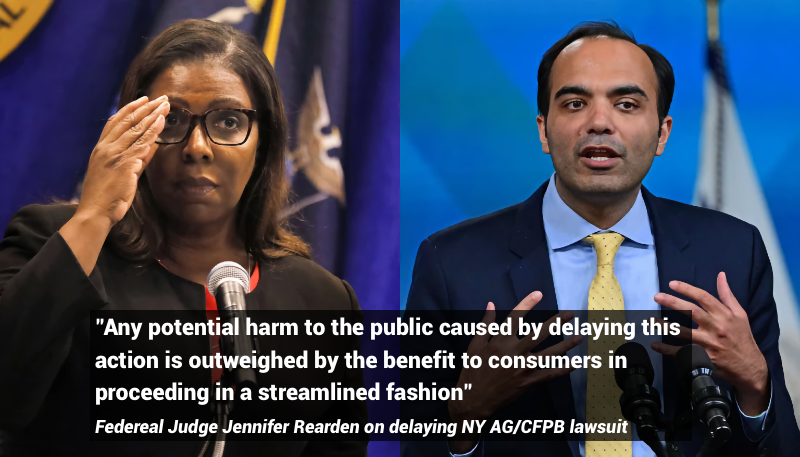This week a look at the uphill battle the CFPB is having in the courts and the high stakes for the agency with the Supreme Court. Also, a look back at the history of credit cards and maybe where it’s headed.
1. CFPB funding suit stalls enforcement action
A predatory lending case in NY has been put on hold because of CFPB funding questions. The delayed case was filed by the NY State AG’s office and CFPB against an auto lender Credit Acceptance. The overseeing Manhattan federal judge Jennifer Rearden has halted the case pending the outcome of an unrelated case with the U.S. Supreme Court.
(Judge) Rearden cited a current Supreme Court case against the CFBP, in which the U.S. fifth circuit court ruled that the agency was unconstitutional by design because of how it receives its funding; the CFBP receives its funding directly from the Federal Reserve and not through congressional approval like other agencies. The CFPB filed a brief earlier this year against that decision.
So far no comment from NY AG Letitia James or the CFPB. Another suit in NY against payment company MoneyGram has been hampered by the underlying questions about the constitutionality of the agency’s funding.
The underlying issue stems from a challenge to the way the agency receives funding from the federal government.
With its brief, the CFPB is seeking to overturn the Fifth Circuit’s decision in Community Financial Services Association of America Ltd. v. CFPB, reached late last year. In that decision, the presiding panel of judges ruled that the CFPB’s design violated the Constitution because it received funding from the Federal Reserve and not the appropriations legislation passed by Congress.
The issue isn’t expected to be resolved quickly.
In February, the Supreme Court agreed to hear the case challenging the Bureau’s constitutionality in its next term. While the Biden administration sought to expedite the ruling in its appeal, the Court will instead wait until its new term in October. However, a decision is not expected to be handed down in the case until early 2024 at the earliest.
2. Sixty years of credit cards
Manoj Radhakrishnan put together a cool time capsule on the history of credit cards. Dating back to the 1930’s in the US, Diner’s Club ramped up what was a cottage industry for department stores and introduced the idea of interchange fees.
In the early 1950’s Diners Club was the first to launch a charge card, primarily inspired by founder Frank McNamara leaving his wallet at home while out dining. Patrons who held the card would charge their meal to the card, and the restaurant would send the bill to the Diners Club.
Diners Club would send payment directly to the restaurant’s bank, taking a small commission for the transaction.

In the context of today’s banking, the potential of “Durbin 2.0” remains stalled in Congress.
For a deeper look at the underlying innovations of card networks, see our piece on VISA innovator Dee Hock.
That’s it this week. Not good news for people that suffer from both ophidiophobia and ornithophobia.. How’d we do this week? Click below to let us know:

